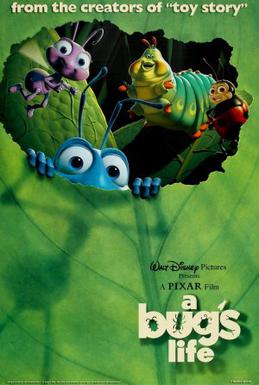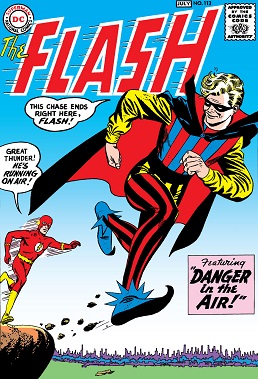The Ute mythology is the mythology of the Ute people, a tribe of Native Americans from the Western United States.

A Bug's Life is a 1998 American computer-animated comedy film produced by Pixar Animation Studios for Walt Disney Pictures. It was the second feature-length film produced by Pixar. Directed by John Lasseter and co-directed by Andrew Stanton, the film involves a misfit ant, Flik, who is looking for "tough warriors" to save his colony from a protection racket run by a gang of grasshoppers. Unfortunately, the "warriors" he brings back turn out to be an inept troupe of Circus Bugs.

The Black Tortoise is one of the Four Symbols of the Chinese constellations. Despite its English name, it is usually depicted as a tortoise entwined together with a snake. The name 玄武 used in East Asian languages does not mention either animal; the alternative name "Black Warrior ~ Dark Warrior ~ Mysterious Warrior" is a more faithful translation.

The Bird People in China is a 1998 Japanese comedy-drama film directed by Takashi Miike from a screenplay by his frequent collaborator Masa Nakamura. The film is considerably more mellow in tone compared to some of the director's more famous works.

The Trickster is a moniker used by three DC Comics supervillains, two of which are enemies of the Flash. Both have been members of the Rogues.

Donald's Golf Game is a cartoon released by the Walt Disney Company in 1938. Donald falters on the fairway while his caddies Huey, Dewey, and Louie all try to "tee" him off, with a grasshopper and a bag of trick clubs.

Paw Paws is an American animated television series produced by Hanna-Barbera Productions that first aired in 1985 and 1986. It debuted as part of the weekday/weekend morning programming block The Funtastic World of Hanna-Barbera.
Ekwensu is a trickster of the Igbo people, a trickster spirit of confusion, that serves as the Alusi (god) of bargains and the tortoise. Crafty at trade and negotiations. He is often invoked for guidance in difficult mercantile situations. He is perceived as a spirit of violence that incites people to perform violent acts. His companion was Ogbunabali.

Tortoise Tales is a 1974 anthology of 13 animal-centered fairy tales from around the world that have been collected and retold by Ruth Manning-Sanders. These tales are written for a younger level of a reader unlike Manning-Sanders' more familiar "A Book of..." series.
African-American folktales are the storytelling and oral history of enslaved African Americans during the 1700-1900s. These stories reveal life lessons, spiritual teachings, and cultural knowledge and wisdom for the African-American community which became part of their cultural heritage. During slavery, African-Americans created folk stories that spoke about the hardships of slavery and created folk spirits and heroes that were able to out wit and out smart their slaveholders and defeat their enemies. These folk stories gave hope to enslaved people that folk spirits will liberate them from slavery. Many folktales are unique to African-American culture, while others are influenced by African, European, and Native American tales.

Many references to ravens exist in world lore and literature. Most depictions allude to the appearance and behavior of the wide-ranging common raven. Because of its black plumage, croaking call, and diet of carrion, the raven is often associated with loss and ill omen. Yet, its symbolism is complex. As a talking bird, the raven also represents prophecy and insight. Ravens in stories often act as psychopomps, connecting the material world with the world of spirits.

Turtles are frequently depicted in popular culture as easygoing, patient, and wise creatures. Due to their long lifespan, slow movement, sturdiness, and wrinkled appearance, they are an emblem of longevity and stability in many cultures around the world. Turtles are regularly incorporated into human culture, with painters, photographers, poets, songwriters, and sculptors using them as subjects. They have an important role in mythologies around the world, and are often implicated in creation myths regarding the origin of the Earth. Sea turtles are a charismatic megafauna and are used as symbols of the marine environment and environmentalism.

The Tortoise and the Birds is a fable of probable folk origin, early versions of which are found in both India and Greece. There are also African variants. The moral lessons to be learned from these differ and depend on the context in which they are told.

In mythology and the study of folklore and religion, a trickster is a character in a story who exhibits a great degree of intellect or secret knowledge and uses it to play tricks or otherwise disobey normal rules and defy conventional behavior.

West African mythology is the body of myths of the people of West Africa. It consists of tales of various deities, beings, legendary creatures, heroes and folktales from various ethnic groups. Some of these myths traveled across the Atlantic during the period of the Trans-Atlantic slave trade to become part of Caribbean, Cuban and Brazilian mythology.
Lambya (Rambia) is a Bantu language of Tanzania and Malawi. In Northern Malawi it is spoken particularly in the Chitipa District.
Lugbara proverbs locally known as E'yo O'beza refers to wisdom from the Lugbara people passed down by grandparents, parents and other relatives to younger generations since time immemorial through stories, parables, idioms and simple phrases, usually around a bon fire. In modern times though, due to formal education, it's not a celebrated activity but elders still teach and advise the young in their day to day encounters. Below are some examples and : meaning.

Igbo Landing is a historic site at Dunbar Creek on St. Simons Island, Glynn County, Georgia. It was the setting of a mass suicide in 1803 by captive Igbo people who had taken control of their slave ship and refused to submit to slavery in the United States. The event's moral value as a story of resistance towards slavery has symbolic importance in African American folklore as the flying Africans legend, and in literary history.

Connie the Cow is a children's television series created by Josep Viciana, and designed by Roman Rybakiewicz. It was produced by Spain-based studio Neptuno Films, and it aired on TV3 in Catalonia. In the United States, it aired on Noggin.
The Cunning Servant is a comical Korean folktale about a cunning young servant who keeps tricking his master, even into marrying his master’s daughter, and ends up living happily ever after. As a socially underprivileged figure, the protagonist relies solely on his skills to turn the tables and achieve success, which tends to offer a sense of mental liberation from conventions and authority.
![]() listen ) (from the Igbo word for tortoise) is the trickster tortoise in Igbo and West African folktales.
listen ) (from the Igbo word for tortoise) is the trickster tortoise in Igbo and West African folktales.












